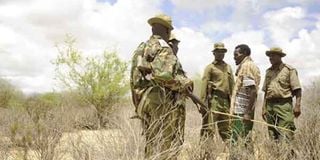Border residents to be part of campaign against terror

Kenyan security forces talk with a local goat herdsman on October 15, 2011, near Liboi, a town on the Kenyan side of the border with Somalia. The Kenya and Somalia governments will be sharing intelligence information on people crossing their common border in a bid to fight terrorism. AFP PHOTO / TONY KARUMBA
What you need to know:
- Al-Shabaab militiamen have been unleashing terror after crossing over the common border — killing innocent people and destroying property.
- Kenya has found it difficult to secure the more than 800 kilometres border stretch. The stretch has only Liboi and Mandera as the designated border points.
The Kenya and Somalia governments will be sharing intelligence information on people crossing their common border in a bid to fight terrorism.
All people living along the common border, and not just security agents, will be involved in this process unveiled on Wednesday following a meeting between Deputy President William Ruto and a delegation from Somalia led by Prime Minister Abdiweli Sheikh Ahmed.
The border residents will be expected to assist their security agents to know who has crossed over either into Kenya or into Somalia.
The aim of sharing the intelligence information, Mr Ahmed told journalists after the meeting, is to allow the two countries to jointly fight the terror that al-Shabaab militiamen from his country have been unleashing on Kenyan soil.
“This information will help us to know who has crossed over the border and it will be shared between the two countries,” Mr Ruto told a press conference he convened at his official residence in Karen after the talks.
GREATER COOPERATION
The whole idea of the meeting was to discuss greater cooperation between the two countries as stipulated in the Joint Cooperation Commission (JCC). The JCC was established last year to tackle developmental issues between the two countries.
But it was timely since Kenyans are almost losing hope in the government’s security agents for what they see as their failure to contain terrorism.
Al-Shabaab militiamen have been crossing over the common border and unleashing terror in Kenya — killing innocent people and destroying property. The new wave of terrorism has threatened to drive away investors.
Kenya has found it difficult to secure the border, which stretches more than 800 kilometres and has has only Liboi and Mandera as the designated border points.
However, there are several other entry points that people — mainly traders — living on each side of the border use to cross over to do business.
They even use vehicles to transport all kinds of goods using the entry points without much restriction.
FLOURISHING BUSINESSES
The entry point of Holugho in Ijara sub-county of Garissa County, which borders Lamu and Tana River counties, has flourishing businesses.
Others include Amuma, which is also in Garissa County, Dif and Elwak, which are in Wajir and Mandera respectively.
Besides, there are several routes al-Shabaab militiamen use to cross into Kenya. This is what has made Kenya very vulnerable to al-Shabaab attacks.
During the press conference, Mr Ahmed, who was the first to address journalists, said the two governments have agreed to launch a legal framework in two weeks’ time through which all Somali refugees in Kenya will be aided to return to their country.
The repatriation had been initiated earlier following a tripartite agreement signed between Kenya, Somalia and the United Nations High Commission for Refugees (UNHCR).
It is this agreement that established the legal framework for Somali refugees in Kenya who wish to return to their homeland to do so voluntarily.
REFUGEE REPATRIATION
The refugees who live in Dadaab sub-county of Garissa have been accused of harbouring al-Shabaab insurgents.
“We shall ensure that there is conducive environment for the refugees at home,” Mr Ahmed said.
The two leaders also agreed to set up a fully-fledged Kenyan Embassy in Mogadishu to further strengthen the relations between the two countries and enhance bilateral trade.
Mr Ahmed thanked Kenya for sending its troops to assist Amisom forces in restoring peace in Somalia.
He said two weeks ago Amisom, supported by the Kenya Defence Forces, managed to liberate nine towns that were being ruled by al-Shabaab.
Mr Ruto promised that Kenya would not shy away from helping Somalia to bring stability in the war-torn country and ensure peace in the Horn of African region.





